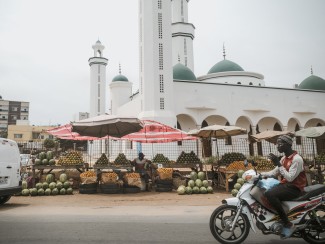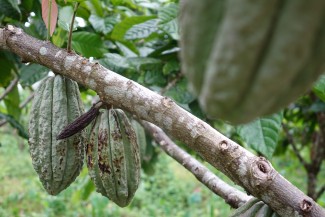Geographical barriers, including isolation from main markets, have resulted in issues for Vanuatu to access international networks and grow its businesses
Trade is a lifeline for the country’s economy: as an island state, Vanuatu depends heavily on imports, and ecommerce could be the solution connecting these rugged islands to its Pacific neighbours, distant capitals and continents, helping to link them to the global trading world.
But what concrete solutions does ecommerce offer such a state? And what does the country need to do to reap e-commerce rewards? With a just-released set of United Nations Conference on Trade and Development (UNCTAD) assessments of Vanuatu, recommendations are in hand along with a way forward.
Following the earlier Rapid eTrade Readiness Assessment of Samoa, the Pacific island nation is now armed with a study that details status, gaps and suggestions to further foster ecommerce development.
Vanuatu Deputy Prime Minister Hon. Bob Loughman said at the report launch, "Technology offers huge and exciting opportunities to a country like Vanuatu. We often hear that one of the biggest constraints to trading in Vanuatu is our geography. We are a set of 83 islands in the middle of the Pacific Ocean. That means that our markets are a long way away and expensive to get to. Technology offers an opportunity to shrink these distances and costs, and we should all recognize the opportunities it offers.
Together with #Vanuatu & @UNCTAD we launched today the #eTReady assessment, part of development solutions to support #Vanuatu in becoming #eCommerce ready pic.twitter.com/inUgcvTP3v
— EIF (@EIF4LDCs) July 18, 2018
Related: Infographic - Vanuatu eTrade Readiness Assessment
ESSENTIAL ANALYSIS
Supported by the Enhanced Integrated Framework (EIF), studies of Samoa, Vanuatu the Solomon Islands and others are providing the necessary entry points for countries to acquire a holistic view of their national eTrade agenda.
EIF Vanuatu Coordinator Simon Hess said at the launch, "the EIF together with development partners have joined hands with Solomon Islands and Vanuatu to develop the islands' trade competitiveness and private sector development, in sectors such as tourism. The key challenge has been in connecting to markets given the distances and limited entrepreneurship base, and thus a focus on market connectivity is critical."
The assessment commended the liberalization of the telecommunications sectors in Vanuatu, which has led to high mobile telephone penetration and a revolution in terms of connecting people in remote areas to the government, banking services, and with each other.
Mobile services are increasingly seen as a driver of socio-economic development, particularly in the areas of financial inclusion, disaster preparedness and response, and for bridging the gender gap. As of 2018, the country study indicates that more than 98% of the population will be covered by a mobile network, and a combination of investments, liberalization and efficient regulatory work has transformed the access and use of ICT in Vanuatu.
Related: Infographic - Solomon Islands eTrade Readiness Assessment
SHORING-UP
The assessment of Vanuatu delves into the challenges faced and the priorities needed to realize emerging ecommerce opportunities. Key challenges elaborated include lack of stable high-speed, cost-effective Internet connections, with only 37% of the population currently using the Internet; limited knowledge and understanding of how ecommerce can transform businesses; financial illiteracy; and, outmoded and missing legal and regulatory frameworks for ecommerce.
Loughman said, "technology will also give the growers and producers of Vanuatu the prospect to interact far more directly with the purchasers of their goods – for example, a kava farmer here in Santo could in theory interact directly with a buyer in America. This would help to make the export process far more efficient, and it should also mean that more money reaches the farmers and producers.”
Hess underscored Vanuatu’s work in supporting tourism and setting up the National Single Window for trade, which is expected to increase the level of automation and reduce the time and cost of trading across borders. "Launching of these specific initiatives demonstrates the progressive vision of Vanuatu to stimulate the economy and leverage opportunities through international trade for delivering growth and development," he said.
In Vanuatu, agriculture and tourism are key targeted ecommerce sectors with products such as coffee, coconut, sandalwood and essential oils – as well as cruise-ship services – high in online trade.
Speaking at the launch, Hess also said, "the launch of the National Single Window project and eTrade Readiness Assessment report during Vanuatu's important Agriculture Festival very clearly demonstrates that trade cuts across all economic sectors. Indeed, as the basis for the majority of Vanuatu's trade in goods, agriculture is the principal and priority sector, for which collaboration will be critical."
#Agriculture with focus on products such as coffee, coconut, sandalwood, essential oils & #tourism identified as key #eCommerce sectors in #Vanuatu #eTReady assessment led by @UNCTAD with #EIF support #eTradeForAll https://t.co/biHZ3ZX7Z4 pic.twitter.com/ZF2WWTG7ti
— EIF (@EIF4LDCs) July 18, 2018
Related: Taking trade online
SAILING AWAY
The eTrade Assessments detail recommendations, including the need to develop holistic national ecommerce strategies, prioritization of legal and regulatory reforms for ecommerce uptake, and ensuring online protection for consumers and proper registration for ecommerce vendors and platforms.
With employment opportunities increasing and the foundations of a solid ICT and services-based economy in place, Vanuatu is slated for graduation from Least Developed Country status in December 2020. But, the geographical and infrastructure barriers mean innovations in business are necessary.
Finding that people in the country still rely on cash and electronic payment systems are little-used, the Vanuatu study recommends speeding up the national payment system law and adopting a national system, which will offer benefits to consumers and businesses.
The report states, “E-commerce adoption by businesses, especially micro, small and medium-sized enterprises, in Vanuatu will require confidence and trust in electronic payment solutions, which are not yet widespread.”
“Similarly, in order to invest in ICT solutions towards moving to online solutions later, banks and microfinance institutions must work hand in hand with the government and leading business associations to ensure that financing gaps are bridged. This could also motivate business incubators and venture capital from Australia, New Zealand and other Pacific Islands nations to put Vanuatu e-commerce on their investment map.”
With detailed findings and clear recommendations such as this, Vanuatu’s ecommerce research works to ensure the recommendations are transformed into action.
Header image - ©EIF
If you would like to reuse any material published here, please let us know by sending an email to EIF Communications: eifcommunications@wto.org.


